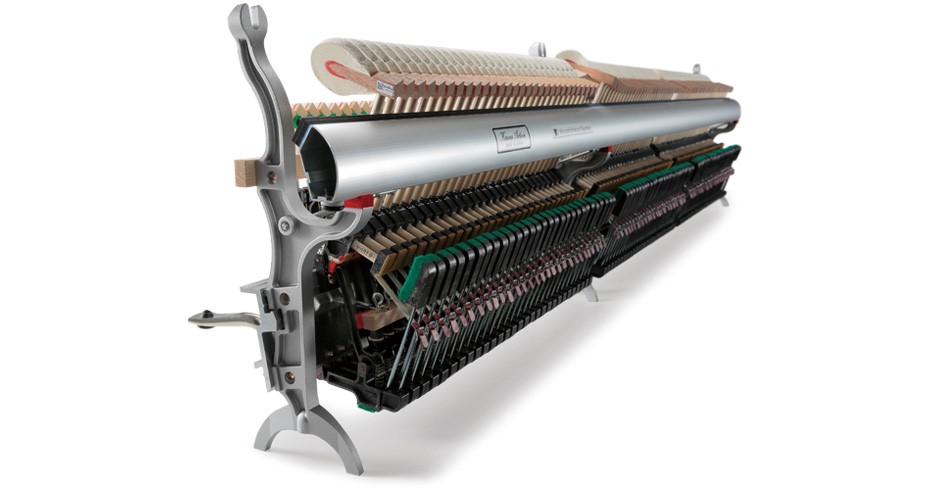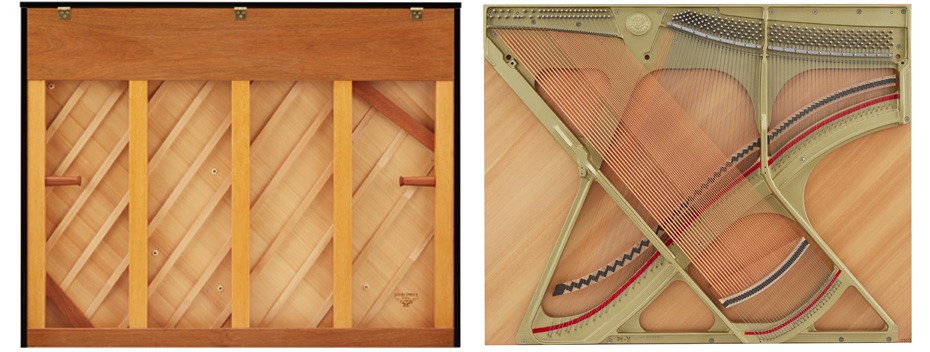Are you looking for a Yamaha piano or a Kawai piano? Two of our most enquired about models are the Yamaha U1 and the Kawai K300.
Yamaha U1 vs. Kawai K300: Are they like for like?
People seek advice about which one is best to buy because they seem very comparable.
Both models are built by Japanese, industry-leading companies who have factories in both Japan and Indonesia. Both pianos stand at a very similar height (Yamaha: 121cm Kawai: 122cm) and are of high-quality.
So, if they look so similar, is there any difference between them?
In this blog we will outline some differences, as well as noting some similarities. Most of the differences will really depend on your personal priorities and preferences.
From experience we’d say it’s 50:50 whether a pianist prefers the Yamaha or Kawai.
The Action
The first major difference between the Yamaha U1 vs. Kawai K300 is the action design.
The U1 is much more traditional, using different wooden synthetics, whereas the Kawai has ventured into new technologies, replacing wooden parts with carbon fibre components.
With Yamaha, you are getting a tried and tested, traditional action.
Meanwhile, the Kawai offers something slightly lighter, which has the potential to speed the action up. This can affect the way it feels to play quite dramatically, but perhaps it is a style of playing you prefer.
 Kawai K300 Millennium III Upright Action
Kawai K300 Millennium III Upright Action
The wooden action of the Yamaha is more likely to be affected by changes related to the seasons, since wood can swell and contract depending on temperature and humidity.
The carbon fibre action of the Kawai is not affected in the same way as an all-wood action and could therefore lower your maintenance costs, but it will feel slightly different to play.
We highly recommend trying both models to compare, especially if you are unsure at the moment what touch and tone you prefer.
The Tone
The tone of a piano is affected by multiple factors including hammer felt, string length, the materials used throughout and the geometry and scaling of the piano.
The hammer felt is created in layers and is compressed together to form the ‘bell-like’ hammer shape we know. Kawai tend not to compress the layers of felt together as much as Yamaha and therefore the tone is typically more mellow.
The Kawai has a slightly longer string length which also helps give it a slightly deeper and warmer sound.
In contrast, the Yamaha offers a brighter sound and a sharper attack. This is down to shorter strings with a higher tension and a slightly harder, more compressed hammer.

Kawai K300 Spruce Soundboard Kawai K300 Strings
The Sound
Both pianos have a solid spruce soundboard. Spruce is a gorgeous tonal wood and really adds a lot of resonance to the tone of the instrument. It also acts as a ‘natural amplifier’ creating an amazing quality of sound.
A difference between the Yamaha U1 vs. Kawai K300 is the piano lid. The Yamaha has a hinge across the top lid allowing you fold back the front half for an improved conveyance of sound. The Kawai does not have this particular feature, although it does include a prop stick to open the lid a couple of centimetres (the Yamaha shares this feature as well).
Hybrid Models
Both the Yamaha U1 and the Kawai K300 are available as hybrid pianos. You can purchase them with a silent system, as a transacoustic piano or as a self-playing model.
To read about the difference between a silent and transacoustic model, click here, or to compare the Yamaha SILENT system with the Kawai Anytime Silent System, click here. If you’d like to investigate self-playing pianos, you can read more here.
Warranty
The Yamaha offers a 5-year warranty, whereas the Kawai comes with a warranty of 10 years.
The Price
The final major difference between the Yamaha U1 vs. Kawai K300 is the cost of them.
Both models offer fantastic value for money. The Kawai is cheaper, however, the Yamaha is more likely to hold its value if you have the budget for it upfront.
The current RRP for the Yamaha U1 in polished black is £8,777. You can purchase this from us for £7,395.
The current RRP for the Kawai K300 in polished black is £5,444. You can purchase this from us for £4,895.
Other colour variations are available. Check our website for details.
Specifications
|
|
Yamaha U1 |
Kawai K300 |
|
Size |
H:121cm/W:153cm/D:61cm |
H:122cm/W:149cm/D:61cm |
|
Action |
Wood |
Millennium III |
|
Hammers |
Hornbeam/Maple Double Felted |
Mahogany Double Felted |
|
Tuning Pins |
Nickel Plated |
Nickel Plated |
|
Centre Pedal |
Mute |
Practice |
|
Fallboard |
Traditional Soft Close |
Traditional Soft Fall |
|
Lock |
Yes |
No |
Recommended
Articles
The Bösendorfer Porsche Piano: A Masterpiece of ...
Best Yamaha Upright Pianos Guide (2023)
Why We Love Sauter Pianos
Back to Blog







